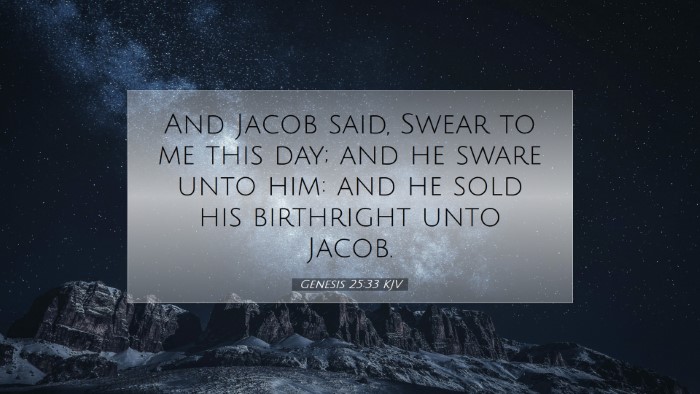Commentary on Genesis 25:33
Bible Verse: "But Jacob said, 'Swear to me first.' So he swore an oath to him, selling his birthright to Jacob."
Introduction
Genesis 25:33 presents a poignant moment in the life of Esau and Jacob, illustrating the complexities of human choices and their divine implications. This commentary combines insights from public domain sources such as Matthew Henry, Albert Barnes, and Adam Clarke, providing a comprehensive analysis for pastors, students, theologians, and Bible scholars.
Context Overview
The narrative of Genesis 25 details the birth of Esau and Jacob, the twin sons of Isaac and Rebekah. The tension between the two brothers is echoed in their birth order and the prophecy concerning the elder serving the younger (Genesis 25:23). This verse occurs in the larger context of Esau's impulsive nature and Jacob's shrewdness, as Esau sells his birthright for a meager meal, signifying deeper spiritual implications.
The Significance of the Birthright
The birthright, traditionally, conferred upon the firstborn son a double portion of the inheritance and the leadership of the family. It was a symbol of blessing and God's covenant promises. Jacob's insistence on swearing an oath highlights the seriousness and irrevocability of Esau's decision, showing a manipulation of sacred rites for personal gain.
-
Matthew Henry: Sees the sale of the birthright as Esau's profound folly and a spiritual tragedy. Henry points out that Esau showed a blatant disregard for the spiritual blessings associated with his birthright, valuing immediate satisfaction over long-term significance.
-
Albert Barnes: Emphasizes that Esau's actions reveal his character. He was a man who lived for the moment and cared little for future implications, stating that he "despised his birthright," showcasing a lack of faith and perspective.
-
Adam Clarke: Analyzes the motivations behind Jacob's request and Esau's acquiescence. Clarke suggests that Jacob's desire for the birthright, though initially unscrupulous, was a part of God’s divine plan, sanctioned by the earlier prophecy regarding the twins' destinies.
Thematic Elements
This verse encapsulates themes of choice, consequence, and the value of spiritual heritage. It invites readers to reflect on what they are willing to compromise for immediate gratification and highlights the tension between divine sovereignty and human agency.
-
Immediate Gratification vs. Long-term Gain:
Esau's quick decision to sell his birthright for a bowl of stew represents a profound spiritual lesson on valuing eternal promises over temporal pleasures. As noted by Matthew Henry, this instance serves as a cautionary tale against succumbing to immediate desires at the expense of one’s spiritual legacy.
-
Divine Sovereignty:
Adam Clarke notes that God's purposes are not thwarted by human decisions. The transaction, although morally questionable, aligns with God's foreordained plan for Jacob to receive the birthright, illustrating how divine providence operates within the scope of human choices.
-
Spiritual Blindness:
Esau's inability to perceive the true value of his birthright reflects a deeper spiritual blindness. Albert Barnes highlights that many today similarly underestimate the importance of their spiritual inheritance in Christ, traded away for fleeting worldly pleasures.
Lessons for Contemporary Believers
The implications of Genesis 25:33 resonate with modern believers, urging them to contemplate the choices they make regarding their faith and inheritance in Christ. This verse serves as a reminder of the perils of prioritizing immediate needs over spiritual commitments.
-
The Value of Spiritual Heritage:
Like Esau, many may take their spiritual inheritance for granted. Believers are called to recognize the profound blessings contained within their relationship with God and the eternal ramifications of their decisions.
-
Faithfulness in Temptation:
This passage urges believers to cultivate a long-term perspective in faith, resisting the allure of momentary temptation, as illustrated by Esau’s impulsiveness.
-
God’s Sovereign Plan:
While our choices remain significant, they operate within the greater context of God's sovereign plan. The narrative encourages individuals to trust in God's overarching plan, as His greater purpose often unfolds through the choices we make.
Conclusion
Genesis 25:33 is more than a historical account; it is a deeply reflective passage that challenges readers to reevaluate their values and choices. Through the lenses of notable biblical commentators, it is evident that this moment serves as a timeless reminder of the significance of spiritual inheritance and the potential folly of temporal decisions. As believers engage with this text, may they be inspired to uphold the value of their spiritual birthright amidst life's choices, ever mindful of the implications of their actions before God’s sovereign will.


